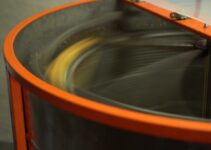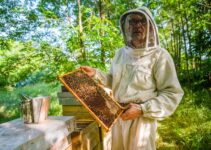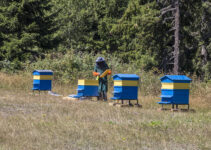As beekeeping becomes increasingly popular, the question of beekeeping insurance is asked more frequently. Is beekeeping insurance a thing, and do you need it? What does beekeeping insurance typically cover?
Beekeeping insurance is necessary for a commercial beekeeper, but there are some grey areas for hobbyists. General liability insurance should be considered as a hobbyist as a minimum protection against lawsuits brought against the beekeeper due to injury caused to others by the bees.
Several insurance products are available for beekeepers, from liability insurance to business insurance. The type of insurance you need for beekeeping depends on your local laws and whether you are a hobbyist beekeeper or keep bees commercially.
Is Beekeeping Insurance Available?
Beekeeping insurance is a thing, with a choice of coverage types depending on the type of beekeeping you do and the type of insurance you need.
Finding an insurance company with a beekeeping policy may be difficult since many companies deem the business volume too low to have a dedicated beekeeping product.
You may have to shop around with several insurance companies in your area to find out what they offer for beekeepers.
Some standard products, such as public liability insurance, will cover beekeeping even if it is not a dedicated beekeeping insurance product.
What types of beekeeping scenarios would require the assistance of an insurance policy?
- Public liability. Someone was injured as a result of your beekeeping activities.
- Product liability. Someone sues you, claiming one of your bee products caused them to suffer injury or loss.
- Equipment loss. Damage or loss of beekeeping equipment from theft, vandalism, or the weather can lead to financial losses for the beekeeper.
- Income loss. Low rainfall can result in crop failure, which is a problem for beekeepers offering farmers pollination services. The lack of forage can decimate bee colonies, especially if there is no other area to place such a large volume of bees.
Are You A Hobbyist Or A Commercial Beekeeper?
A key distinguishing factor when searching for beekeeping insurance is whether you are a hobbyist or a commercial beekeeper.
There is sometimes a grey area in this distinction, as hobbyist beekeepers may sell their bee products, but does this disqualify them from hobbyist status from an insurance point of view?
There is no definitive answer for this situation, as different insurance companies will have varying wording in place for this scenario. The best option is to speak to your insurance supplier and ask them what their policy is in this regard.
Certain types of insurance are important for hobbyists and commercial beekeepers, while others are only relevant to commercial beekeepers.
Life Insurance For Beekeepers
Life insurance is a product everyone should have, especially if you have dependents in your household who rely on you to be the breadwinner.
This applies to hobbyists and commercial beekeepers alike. The life insurance cover does not need to be a dedicated beekeeping policy, but you must check the fine print of your life cover policy to ensure beekeeping is an activity that is covered.
Some life insurance products require you to notify the company if you participate in any potentially life-threatening activities. The company needs to know this to assess your risk level, and they will charge your premium accordingly.
Activities such as scuba diving, skydiving, free climbing, motor racing, and in some cases, beekeeping are deemed to be dangerous activities, and the company will charge a higher premium or decline cover.
If you did not disclose your beekeeping to your insurance company and you died due to an accident while beekeeping, the company could refuse to pay out the claim.
Check the exclusions or the required activities that require you to notify your insurer to avoid any such problems.
Liability Insurance For Beekeepers
There are two main types of liability insurance; public liability, which protects you from claims for injuries caused to people by your bees, and product liability insurance to protect you against claims against your bee products.
Public Liability Insurance For Beekeepers
Liability insurance is an insurance product that all beekeepers should consider. Some states protect beekeepers against liability claims as long as their beekeeping activities are conducted according to local state and municipal laws.
You should check your local beekeeping regulations to identify whether your state offers this type of exemption.
If your state does not offer this benefit, liability insurance is a good idea for hobbyists and commercial beekeepers.
This insurance will cover you against personal injury claims from people who are injured (stung) by your bees.
Public liability can also cover you if you sell your products in a public place, such as a farmers market or an open market. Many of these markets will not allow you to sell your products or give you a table unless you can produce a liability insurance certificate.
Product Liability Insurance For Beekeepers
If you sell some of your bee products, such as honey, beeswax products, and comb honey, there is the risk that someone could lay a claim against you that your product caused a health problem for them and sue you for damages.
Many insurance companies will only offer product liability insurance if you have a business insurance policy with them.
This type of insurance is typically for a commercial beekeeper, but you should consider it as an option if you are a hobbyist selling your bee products.
Business Insurance For Beekeepers
Commercial beekeepers run their beekeeping as a business, and there are risks and expenses in running any business. Beekeeping insurance should be considered a normal cost of doing business.
Business insurance for a beekeeper can cover everything from income loss due to the loss of bee colonies due to disease, theft, vandalism, weather damage, and even crop failures.
The USDA has instituted a pilot insurance policy for beekeepers, where beekeeping is your primary source of income, to insure against weather conditions, drought, and crop loss.
Business insurance policies are generally more expensive than other policies, but they cover more aspects of your business than private policies.
The USDA also has two programs: Non-insured Crop Disaster Assistance Program or NAP and Emergency Livestock Assistance Program or ELAP, which includes honey bees.
These programs will assist certain qualifying beekeepers with losses suffered in their beekeeping business through circumstances beyond their control.
Sections of these government programs are free, while others require a small fee for qualifying beekeepers.
Insurance For Hobbyist Beekeepers
What are your options as a hobbyist beekeeper? What does your household insurance cover, and should you look at taking out additional insurance for your beekeeping?
Normal homeowner policies would not cover the loss of beehives due to damage or theft. There may be a section in your policy where you can cover hives as a separately stipulated asset.
You must ensure that this section offers cover for the replacement value of the hives, not an adjusted value based on the age of the equipment.
All your beekeeping equipment will be covered against theft or damage if it is stored in your home and is burglarized. It is a good idea to stipulate your beekeeping equipment on your policy to ensure the company will cover it in the event of a loss.
Your equipment will not be covered for loss or damage during normal beekeeping work.
Do You Need Beekeeping Insurance?
Commercial beekeepers should investigate a business policy to cover their operation since it is their livelihood.
Most hobbyists won’t lose too much investment if they lose a few hives to weather damage, disease, or theft, but losses from these events could be devastating for a commercial beekeeper.
In some cases, insurance is a choice for the hobbyist, depending on the legal requirements of the state where they live.
Liability insurance would be the minimum insurance I would recommend for a hobbyist beekeeper to cover against claims resulting from injuries caused by your bees.
Many beekeeping associations develop a relationship with an insurance company and negotiate lower insurance rates for their members, especially if the beekeeper has undergone the training offered by the beekeeping association.
Conclusion
Beekeeping insurance is a necessity for a professional beekeeper, but the hobbyist has the decision to make whether they want to insure or take a risk.
The mindset of “it will never happen to me” is fine until it does. At that point, insurance is a valuable asset. Research the insurance policies available to you and decide on the insurance you can afford, but consider general liability insurance a non-negotiable starting point.
References
https://www.rma.usda.gov/en/Fact-Sheets/National-Fact-Sheets/Apiculture-Pilot-2017
https://generalliabilityinsure.com/small-business/beekeeper-insurance.html
https://generalliabilityinsure.com/small-business/beekeeper-insurance.html
https://www.abfnet.org/page/insurance




